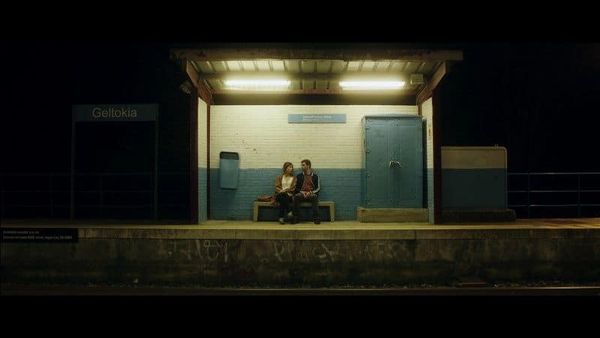Eye For Film >> Movies >> Pikadero (2015) Film Review
Pikadero
Reviewed by: Amber Wilkinson

The European economic crisis and its particularly adverse impact on the young provides the backdrop for Scots director Ben Sharrock's warm and quirky debut feature. Shot in the Basque country and in the Basque language, Pikadero is competing for three awards, including best New Director, at this year's San Sebastian Film Festival.
In Spain, the title refers not only to riding schools but is also slang for a public place used for sexual trysts. In the case of Gorka (Joseba Usabiaga) and Ane (Bárbara Goenaga) It's a certainly not a case of dogging or exhibitionism that leaves them desperate to find somewhere where they can be alone but the fact they are dogged by still living at home with barely any cash despite nudging 30. Gorka works as an unpaid apprentice at the local tool making factory, with dreams extending no further than achieving a full-time job there like his father, while Ane is a perpetual student, studying art despite the fact she freely admits she can't draw or paint. In an ideal world she wants to teach but, in this one, finds herself drawn to the idea of working in Edinburgh in a bid to learn English and better herself.

Sharrock takes an even-handed approach to this fledgling relationship. Ane and Gorka may be stuck but they are normal, likeable characters who clearly care about one another and the frisson between Goenaga and Usabiaga carries plenty of unspoken heat and is driven as much by a desire to share space alone than by a simple need for sex. Sharrock makes the lush green open spaces of the Basque country and the quiet rural station that Ane and Gorka are often seen at look as though they are in the middle of nowhere and yet every time there's a suggestion of snogging a third (or fourth) person always seems to enter the frame.
The director and his cinematographer Nick Cooke (also making a very impressive feature debut here) mine the visual situation for humour. Shooting mostly with a fixed camera that means they can 'crowd' the frame to comic effect when needs be. This is particularly well employed in Gorka's home - where three generations of his family seem to be virtually sitting on top of one another of an evening, to the accompaniment of the sound of his mother's perpetually churning washing machine. A rugby game in which we see they players charge in one side of the frame and out of the other repeatedly, is also comedy gold. Just once or twice - notably a bathroom and present wrapping scene - does it feel as though Sharrock is trying a bit too hard when he would be better to keep the faith with the style he has chosen for the rest of the film.
The humour has a gentle absurdity, which feels as much British as Basque and recalls the likes of Bill Forsyth's Gregory's Girl, but beneath it Sharrock generates strong empathy for the characters' situation. His use of Gorka's factory fruit-sharing pal - who is learning German and plans to go to Berlin - as a sort of sounding board for Gorka (not that the pair of them say much) means the film is more from his perspective but Ane is not merely a bit player. Her dreams matter too. Sharrock also shows a Aki Kaurismäki-like interest in colour. Blues, whites and yellows dominate in a way that helps this slight but enjoyable story come pleasingly together, while he also shares the Finnish director's interest in societal issues. A fine, observant comedy from a young director who takes chances that pay off and who, like his two main characters, has plenty of potential.
Reviewed on: 21 Sep 2015
















